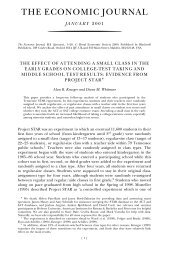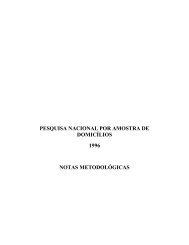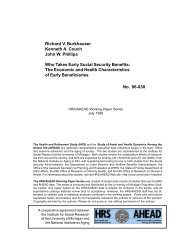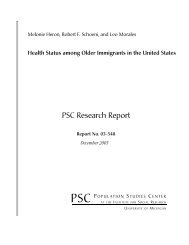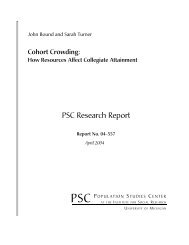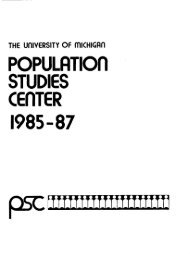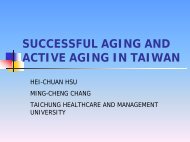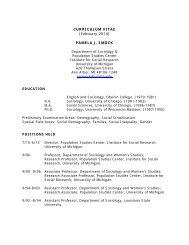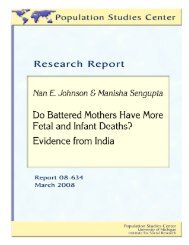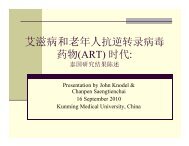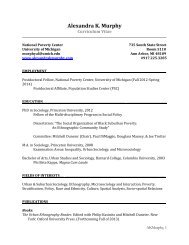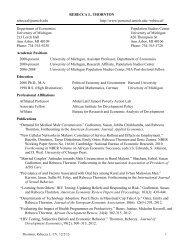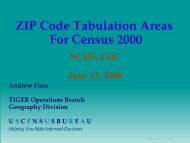Population Ageing and the Well-Being of Older Persons in Thailand ...
Population Ageing and the Well-Being of Older Persons in Thailand ...
Population Ageing and the Well-Being of Older Persons in Thailand ...
Create successful ePaper yourself
Turn your PDF publications into a flip-book with our unique Google optimized e-Paper software.
Section 3: Demographic, Social <strong>and</strong> Economic Pr<strong>of</strong>ile<br />
3.4 Summ<strong>in</strong>g up<br />
Thail<strong>and</strong> is particularly fortunate <strong>in</strong> hav<strong>in</strong>g extensive<br />
nationally representative survey data that permit<br />
construct<strong>in</strong>g a relatively detailed <strong>and</strong> up to date<br />
pr<strong>of</strong>ile <strong>of</strong> <strong>the</strong> social <strong>and</strong> economic situation <strong>of</strong><br />
today’s elderly as well as trends over <strong>the</strong> recent past.<br />
The results reviewed above are encourag<strong>in</strong>g <strong>in</strong> several<br />
respects but also serve as warn<strong>in</strong>gs that <strong>the</strong>re are<br />
multiple challenges that need to be addressed by policy<br />
<strong>and</strong> programmes to ensure <strong>the</strong> security <strong>and</strong> wellbe<strong>in</strong>g<br />
<strong>of</strong> <strong>the</strong> elderly as population age<strong>in</strong>g proceeds.<br />
Among <strong>the</strong> most encourag<strong>in</strong>g f<strong>in</strong>d<strong>in</strong>gs are those that<br />
document <strong>the</strong> significant improvement <strong>in</strong> <strong>the</strong><br />
material well-be<strong>in</strong>g <strong>of</strong> <strong>the</strong> older population <strong>in</strong> recent<br />
years as measured by hous<strong>in</strong>g quality <strong>and</strong> household<br />
possessions. Compared to just a little over a decade<br />
ago, <strong>the</strong> households <strong>of</strong> older Thais <strong>in</strong> 2007 have far<br />
more appliances, convenient amenities <strong>and</strong> vehicles<br />
available for transportation. The very dramatic spread<br />
<strong>of</strong> telephones, especially mobile phones, has greatly<br />
improved <strong>the</strong> ability <strong>of</strong> elderly <strong>and</strong> <strong>the</strong>ir children <strong>and</strong><br />
relatives who live elsewhere to communicate with each<br />
o<strong>the</strong>r. This both provides a convenient means <strong>of</strong><br />
ma<strong>in</strong>ta<strong>in</strong><strong>in</strong>g social contact <strong>and</strong> <strong>of</strong> reach<strong>in</strong>g <strong>the</strong><br />
appropriate parties at times <strong>of</strong> urgent need such as<br />
dur<strong>in</strong>g health crises or o<strong>the</strong>r urgent situations.<br />
Also reassur<strong>in</strong>g is <strong>the</strong> f<strong>in</strong>d<strong>in</strong>g that material assistance<br />
from adult children has not dim<strong>in</strong>ished despite <strong>the</strong><br />
extensive social change that is <strong>of</strong>ten assumed to<br />
underm<strong>in</strong>e filial responsibility. Not only do <strong>the</strong> vast<br />
majority <strong>of</strong> elderly receive some <strong>in</strong>come from<br />
children but <strong>the</strong> per cent who <strong>in</strong>dicate that children<br />
are <strong>the</strong>ir ma<strong>in</strong> source <strong>of</strong> support has changed little<br />
dur<strong>in</strong>g <strong>the</strong> last decade or so. In addition, a<br />
substantial share <strong>of</strong> older persons receive government<br />
welfare allowances. Moreover, those <strong>in</strong> greatest<br />
f<strong>in</strong>ancial need are far more likely to receive allowances<br />
than those <strong>in</strong> least need. Still significant shares <strong>of</strong><br />
those <strong>in</strong> quite poor circumstances are not yet <strong>in</strong>cluded<br />
<strong>in</strong> <strong>the</strong> programme.<br />
An important concern <strong>of</strong> <strong>the</strong> Madrid International<br />
Plan <strong>of</strong> Action is promotion <strong>of</strong> gender equity among<br />
older persons with emphasis on rectify<strong>in</strong>g<br />
disadvantages that older women might be <strong>in</strong>curr<strong>in</strong>g<br />
(Knodel & Ofstedal 2003). The situation among Thai<br />
elderly is relatively encourag<strong>in</strong>g <strong>in</strong> this respect also. It<br />
is true that among <strong>the</strong> current older Thais, women<br />
have received less education than men <strong>and</strong> <strong>in</strong> this sense<br />
are disadvantaged. However, projections <strong>of</strong> <strong>the</strong><br />
educational atta<strong>in</strong>ment <strong>of</strong> <strong>the</strong> future older population<br />
reveal that this disadvantage will decl<strong>in</strong>e steadily over<br />
<strong>the</strong> next few decades through a process <strong>of</strong> cohorts<br />
succession reflect<strong>in</strong>g <strong>the</strong> <strong>in</strong>creased access to education<br />
that women experienced over <strong>the</strong> last half century <strong>in</strong><br />
Thail<strong>and</strong>. Indeed because among <strong>the</strong> school-aged<br />
population <strong>in</strong> recent years, women are receiv<strong>in</strong>g more<br />
education than men, <strong>in</strong> several generations <strong>the</strong><br />
gender gap <strong>in</strong> education among <strong>the</strong> elderly is likely to<br />
reverse. One very strik<strong>in</strong>g difference between older<br />
men <strong>and</strong> women is with respect to marital status with<br />
far more older women than men be<strong>in</strong>g widowed. This<br />
likely is a disadvantage for many widowed women <strong>in</strong><br />
terms <strong>of</strong> psychological <strong>and</strong> social support <strong>and</strong><br />
physical care <strong>the</strong>y would o<strong>the</strong>rwise expect from a<br />
spouse. But at least with respect to perceived <strong>in</strong>come<br />
sufficiency or f<strong>in</strong>ancial satisfaction, our f<strong>in</strong>d<strong>in</strong>gs show<br />
little difference for ei<strong>the</strong>r men or women whe<strong>the</strong>r<br />
currently married or not. Also it is important to<br />
recognize that this disadvantage stems <strong>in</strong> part from<br />
women’s dist<strong>in</strong>ct advantage with respect to mortality<br />
as discussed <strong>in</strong> <strong>the</strong> next section.<br />
Particularly encourag<strong>in</strong>g with regard to gender<br />
equality among <strong>the</strong> older Thai population is that little<br />
difference exists between men <strong>and</strong> women with<br />
respect to ei<strong>the</strong>r hous<strong>in</strong>g quality or household<br />
possessions. Gender differences <strong>in</strong> personal <strong>in</strong>come<br />
<strong>and</strong> wealth show that women are disproportionately<br />
represented among <strong>the</strong> lower categories <strong>and</strong><br />
underrepresented among <strong>the</strong> highest. However, this<br />
is only <strong>the</strong> case among older persons who are<br />
currently married <strong>and</strong> who are likely to share <strong>in</strong> <strong>the</strong><br />
30



